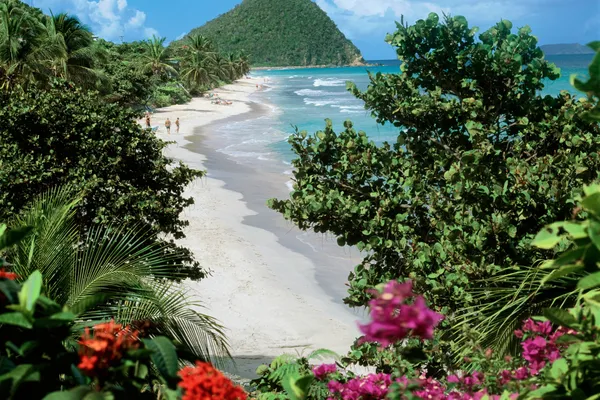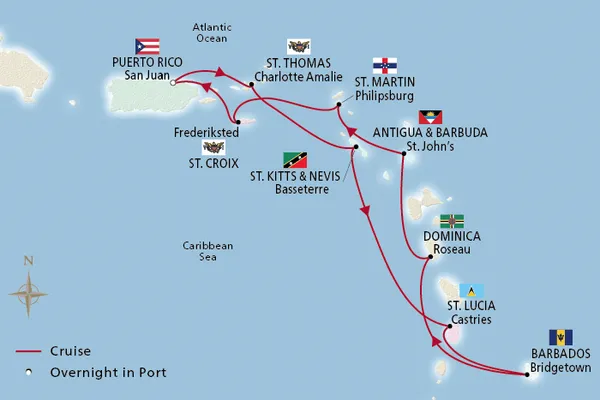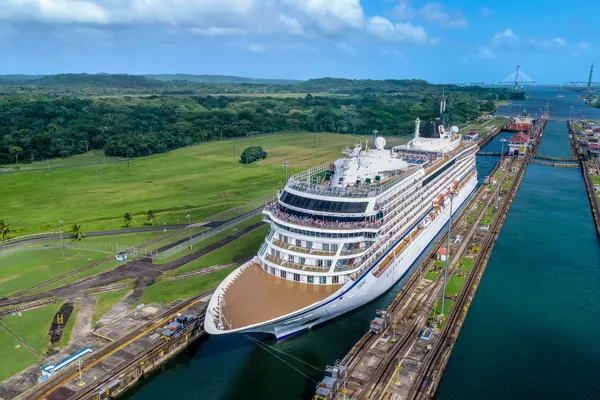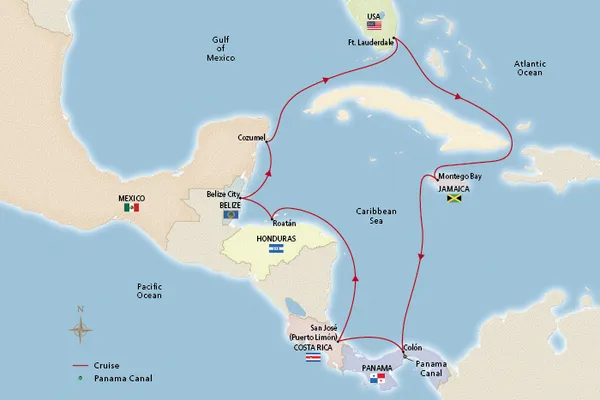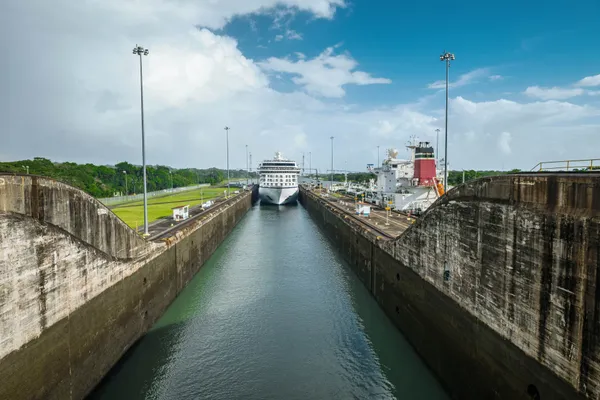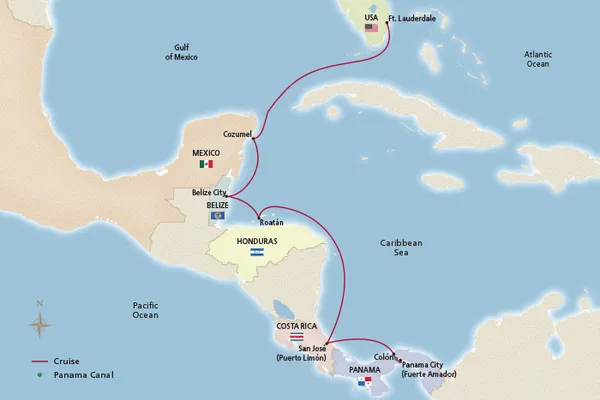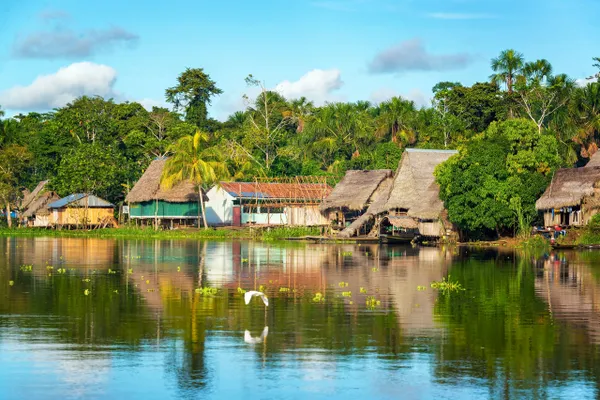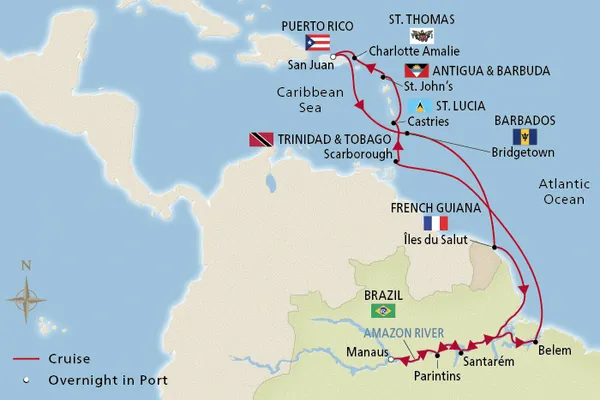
Set sail for the Caribbean & Central America
Experience the incomparable beauty and rich cultural heritage of the Caribbean and Central America. Read on to learn more about the diverse countries that comprise this breathtaking region and explore the enriching experiences that await you in Panama, Puerto Rico, the Virgin Islands and beyond. Enhance your knowledge of Central American cuisine, discover why nature is a crucial part of Caribbean identity and uncover the remarkable flora and fauna native to this part of the world.

Caribbean & Central America
Central America is the southernmost region of North America, situated between Mexico and South America. Comprised of Panama, Costa Rica, Nicaragua, Honduras, El Salvador, Guatemala, and Belize, this tapering landmass separates the Pacific Ocean, to the west, from the Caribbean Sea. Humid swamps and lowlands lie along the east and west coasts, but 80 percent of Central America consists of hilly or mountainous terrain.
With its tropical climate, diverse vegetation, remarkable wildlife, vibrant traditions and historic landmarks, Central America offers visitors a wide array of natural and cultural treasures, including:
- Altun Ha in Belize, where several Mesoamerican temple-pyramids stand as testament to an advanced civilization that dates back as far as 900 BC
- The lush rainforests and striking mangrove forests of Honduras
- Costa Rica’s abundant coffee, banana, and chocolate plantations
- The Panama Canal, an engineering wonder that took 33 years to complete
Spanning more than 1 million sq mi. (2,589,988 sq km) and reaching depths of more than 25,000 ft. (7,620 m) in the Cayman Trench, the Caribbean Sea is one of the largest and deepest seas in the world. These brilliant turquoise waters earned their name from the Carib, the Indigenous people of the Lesser Antilles. The sea is framed by Venezuela, Colombia and Panama to the south and Jamaica, Cuba, Haiti and Puerto Rico to the north. In the southern tropics of the Caribbean, the average water temperature is an inviting 81° F (27° C).
There are more than 7,000 islands and cays across the Caribbean that represent 28 different nations. These islands are divided into the Greater Antilles, the Lesser Antilles and the Bahamas. Though the exact geologic age of the Caribbean is not known, it is believed that it was once connected with the Mediterranean Sea during the Paleozoic era (540 to 250 million years ago). An impressive array of wildlife calls the Caribbean home—90 species of mammals, including whales, dolphins and seals; 500 species of reptiles, such as iguanas and crocodiles; and 1,000 species of fish, including sharks, rays, parrotfish, grouper, eels and many more.

-
Cuisine—5 Central American favorites
Cuisine in Central America consists of a delightful fusion of flavors and ingredients from a variety of cultures, including native Mesoamerican traditions, Caribbean and Afro-Caribbean dishes and even Mediterranean influences, due to the region’s colonial past. The prevalence of coastline means that there is a strong reliance on seafood, as well as local vegetables and tropical fruits. Central American food is generally well-balanced and fresh, with a compelling balance of sweet, salty, sour, bitter and umami components. Here are five popular Central American dishes that visitors may wish to try:
- Hojaldres (Panama)
This traditional breakfast bread consists of a fried dough made from flour, sugar, salt and oil. Flat and round, hojaldres have the texture of a doughnut but are usually topped with cheese and served with salchichas guisados, a sausage stew perfect for dipping. - Rice & beans with stewed chicken (Belize)
This simple meal, which can be purchased from street-side vendors, is the national dish of Belize. Fragrant rice and red kidney beans are cooked with coconut milk to create a filling, flavorful base for tender chicken spiced with recado, a paste made from achiote peppers. - Picadillo de papa (Costa Rica)
Traditionally served with tortillas and rice, picadillo de papa is a savory dish comprised of finely chopped bell peppers, onions, ground meat and potatoes. - Yuca al mojo (Panama)
Usually served as a side dish, yuca al mojo is a flavorful Panamanian favorite that consists of boiled cassava marinated in a zesty sauce made with garlic, cilantro and lemon juice. - Tres leches cake (Nicaragua)
Many believe that the original recipe for “three milks cake” originated in Nicaragua, where it was printed on milk cans to promote sales. Today, this delectable sponge cake—covered in evaporated, condensed and whole milk—is popular throughout Central America.
- Hojaldres (Panama)
-
Culture—The importance of nature to Caribbean identity
The Caribbean's lush rainforests and national parks are not only natural wonders; they are integral to the region's identity and culture. While these tropical areas now draw travelers from all over the world, local residents have a strong connection with the unique ecosystems that have defined life on the islands for millennia.
For example, El Yunque National Rainforest, located in northeastern Puerto Rico, is the sole tropical rainforest within the national forest system of the United States. Its name is derived from the Indigenous Taíno word Yuke, or “white fields,” in reference to the thick fog that encircles the top of El Yunque Peak. The Taíno believed that the deity Yúcahu resided on the mountain, protecting his people from Guabancex, the goddess of chaos and disorder.
The natural environment has long provided Caribbean peoples with medicinal plants, herbs and fruits—many of which have had a significant impact on the region’s economy, cuisine and culture. Visitors may learn about some of these traditional plants during visits to facilities like the Lokono medicinal garden at PEG Farm in Barbados or Claremont Farms in Antigua, a private agricultural estate that cultivates the rare, exceptionally sweet Antiguan black pineapple.
Today, conservation is a critical part of Caribbean culture, and efforts to protect wildlife through education and outreach programs highlight the region's commitment to preserving its unique natural heritage. Such efforts can be seen in the case of the St. Lucia parrot (Amazona versicolor), which was designated as St. Lucia’s national bird in 1979. This intelligent, amusing and beautiful creature is only found in St. Lucia’s interior rainforests, where it is known to locals by its French name, Jacquot. With its green body, blue head and striking red chest and belly, it would be hard to miss this colorful avian.
As these examples show, the Caribbean's wildlife is a cornerstone of its identity and culture, reflecting the region's natural beauty, ecological diversity and cultural heritage.
-
Nature—The stunning flora & fauna of Central America & the Caribbean
There is no doubt about it—Central America and the Caribbean islands are home to a special kind of magic. With its tropical vegetation, glorious sunsets and abundance of marine wildlife, this sun-kissed area of the world offers countless pleasures for curious travelers. Read on to learn more about some of the most wondrous plants and animals this lush region has to offer:
Caribbean orchids
With a warm climate year-round, a phenomenal amount of radiant flora sprout from the wet, tropical soils of the Caribbean, including many beautiful orchids (Orchidaceae). An astonishing 25,000 species of orchid grow throughout the Caribbean, making them one of the most abundant flowering plants here.Typically, orchids grow on trees or cling to rocks in the lush rainforests and river areas. These colorful, exotic flowers are famously known for their pretty petals, sepals (the protective cover of a flower bud) and an eye-catching lip (also called a labellum), which blossoms at its vibrant center and is used to attract pollinators. Another stand-out feature of the orchid is its column, which uniquely combines the stamen and pistil—male and female reproductive organs—into a single structure.
Puerto Rico’s unique coquí tree frog
The coquí tree frog (Eleutherodactylus coqui) is a common frog found in Puerto Rico, measuring about 1 in. (2.5 cm) in length and weighing about 4 oz. (113 g). They have a light-brown body, a yellowish-brown marking on their back and a whitish-colored belly. Unlike most frogs, these species do not have webbed feet; instead, the toe pads enable them to climb trees vertically and hang from leaves. Another unique fact about these frogs is that they do not undergo the tadpole stage but rather emerge as tiny frogs with short tails. They are nocturnal animals and spend most of their time resting when not hunting for food.These creatures are carnivores and feed on crickets, spiders, lizards, snails and other arthropods. To catch their prey, they stay perfectly still, allowing them to get close before striking. During the mating season, the male produces a unique sound at night known as a “coquí”—where it also gets its name from—to attract females and repel their male counterparts. They tend to exhibit territorial behavior during this period, as they attack and chase intruders when they feel threatened.
Caribbean & Central America Highlights
A journey through this region of the world showcases the idyllic beauty of the Caribbean, captivating Mayan ruins in Central America and rich cultural diversity. You may also choose to traverse the Panama Canal, an engineering feat. Here is a preview of some of the remarkable sights and activities you may experience in the Caribbean and Central America:
- Soaring pyramids and temples of Chichén Itzá
- Colorful Caribbean marine life by snorkel, scuba or kayak
- Lush, picturesque forests of Costa Rica
- Local aged rum from Barbados and Jamaica
- St. Lucia’s famed twin Pitons, a UNESCO World Heritage Site
- Fascinating Mayan ruins at Belize’s Altun Ha
- Deep sea sportfishing for the catch of the day
- Natural wonders of Bridgestone’s Harrison’s Cave
Caribbean & Central America Travel FAQ
Enriching Itineraries—Caribbean & Central America
Choose one of our immersive voyages and discover the many benefits of exploring in Viking comfort.



